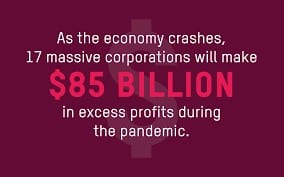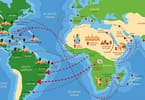Profits Before People

While the tourism industry has been devasted by the COVID-19, leadership in the industry has been curiously silent. The business segment with the highest profile? Cruise lines. The executives have not apologized for playing a major role in transmitting the virus through their negligence and their head-in -the-sand approach to management. They have also ignored the thousands of passengers and staffers who are stranded at sea without any hope of getting off the ships and repatriated home. As of September 11, 2020, 300,000 seafarers were stuck on cruise ships without medical or financial assistance or the wherewithal to return to family and friends.
Airline executives have worried more about Wall Street and their falling stock prices than trying to find and implement new technology, anti-microbial surfaces and improved cleaning techniques that could reduce COVID-19 particles from the HVAC system. The protocols required to keep sick people off their planes, providing medical care to people who are able to sneak onto planes, get sick and die, and alerting passengers about onboard pathogens from infected passengers – all these measures have been ignored. The executives are also silent about recognizing and rewarding good Samaritans who do the jobs that should be tasked to crew. The cruise line and airline industries definitely lead in the belief that profits are more important than people.
Леадерсхип Вацуум

Should global leaders have been aware of the possibility of a pandemic like COVID-19? The short answer is YES! For many years’ health and economic agencies and institutions have been warning of the increased imminent likelihood of a harmful global pandemic. The World Economic Forum (WEF) held meetings and had on-going conversations with political, business and healthcare experts – assessing key risks to the global economy.
In 2006, during the first Global Risk Report, a pandemic was one of four key risk scenarios. It is curious to note that in the 2020 Global Risk Report, infectious diseases ranked third in likelihood (behind weapons of mass destruction and inflation) and tenth in potential impact and noted as one of the least inter-connected risks. Why were pandemics moved to the back-burners?
The World Health Organization (WHO) initiated and coordinated the response to SARS through its Global Outbreak Alert and Response Network (DOARN) in cooperation with its partner organizations that include 115 national health services, academic institutions, technical institutions and individuals. This public health network was originally developed to manage outbreaks of influenza and other infectious diseases and it is now clear that multinational, collaborative, and coordinated surveillance, research and containment measures greatly limited the spread of SARS [THE NATIONAL ACADEMIES PRESS nap.edu/10915].
Other global organizations have also raised warning flags and encouraged the development of preparedness for persistent virulent pandemics that makes international travel a personal risk and should be highly regulated to prevent the spread of these potential biohazards; however, leadership, participation and recommendations from the hotel, travel and tourism industries are absent from the conversations.
Contagious and Deadly
Although the world has lived through epidemics and pandemics, and COVID-19 is considered not as contagious as measles and not as likely to kill an infected person as EBOLA; however, with COVID, people start shedding the virus several days in advance of symptoms. So, asymptomatic people transmit the virus before they know to self-isolate or take other measures (i.e., physical distancing, wearing masks), to protect family and friends.
As of December 26, 2020, there have been 79.9M cases and 1.75 deaths from COVID-19 [nytimes.com/interactive/2020/us/new-york-coronavirus-cases.html] and the International Labor Organization (ILO) predicted that 25 million jobs have been threatened by this new virus.
кликните овде да бисте наставили са читањем
ШТА УЗНЕСТИ ИЗ ОВОГ ЧЛАНКА:
- It is curious to note that in the 2020 Global Risk Report, infectious diseases ranked third in likelihood (behind weapons of mass destruction and inflation) and tenth in potential impact and noted as one of the least inter-connected risks.
- Other global organizations have also raised warning flags and encouraged the development of preparedness for persistent virulent pandemics that makes international travel a personal risk and should be highly regulated to prevent the spread of these potential biohazards.
- Although the world has lived through epidemics and pandemics, and COVID-19 is considered not as contagious as measles and not as likely to kill an infected person as EBOLA.





















